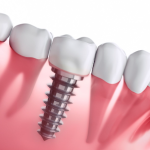Not too long ago, the only alternatives to losing a tooth (or several teeth) were having a fixed bridge installed or wearing removable dentures. Both of these came with significant hassle and maintenance. This is why dental implants were developed. A dental implant is an artificial tooth that fuses to the jawbone. Then the implants are nearly as strong as your natural teeth. Here are three things you should know before getting dental implants.
The Benefits of Going with Dental Implants
Some people are afraid of getting dental implants since you are having minor surgery. They ignore the ongoing issues with dentures. For example, dentures can affect your bite or make it harder to speak. Another benefit of dental implants is that they can easily replace individual missing teeth while traditional dentists would pull the one or two remaining teeth so you can have a partial or full bridge. Nor do you have to deal with messy adhesives. Furthermore, dentures and a deteriorating jawbone warp your face. You also avoid problems like contact sores or friction marks on the gums.
Dentures and bridgework are actually riskier, too. Dentures and bridgework have a fifteen to twenty percent failure rate within ten years. Dental implants have a roughly two percent failure rate. That’s a tenth of the risk of problems over dentures and bridges. This is partially due to the fact dentures can trap food like natural teeth and cause gum decay. Another problem with dentures is that they accelerate bone loss and weaken your jaw because they don’t stimulate the jawbone.
Another point in favor of dental implants is that they allow you to eat almost anything. You don’t have to limit yourself to soft food because hard or crunchy food could break the dentures. This allows you to continue eating the foods you love and easily maintain a healthy diet.
The Importance of Going with the Pros
Dental implant surgery is a multi-step process. The process involves removing damaged teeth unless you’ve already had them pulled. The process may require bone grafts, depending on the condition of your jawbone. The odds of complications and repeat procedures go down when you go with the pros. For example, clinics like Elite Dentistry of Simi Valley offer state of the art, All-On-4 dental implants. These revolutionary implants require only four precisely placed implants on the top and bottom of your mouth. Putting these in place is much faster and easier than inserting a dental implant for each and every tooth that is missing. You also want to go with a professional because they are the most likely to give you implants that look and feel like the natural teeth you’ve lost. For example, it takes special care to create a crown that is almost indistinguishable from your remaining teeth.
Not Everyone Is a Candidate for Implants
A few things can prevent you from having dental implants. One is if you have poor oral hygiene. The implant site needs to be properly cleaned after surgery to minimize the risk of infection.
You could also be rejected because of a health condition that affects bone growth. You have to have adequate bone structure for the implants to fuse to the bone. Furthermore, if you don’t have a full-grown jawbone, you aren’t a candidate for dental implants. You shouldn’t have dental implants done if there is an infection in or around the implant site.
Conclusion
Dental implants are an excellent alternative to dentures and bridges. They have many benefits and are widely accessible, but they aren’t an option for everyone, so make sure that you speak with a qualified dentist and see if they’re the best choice for you.







